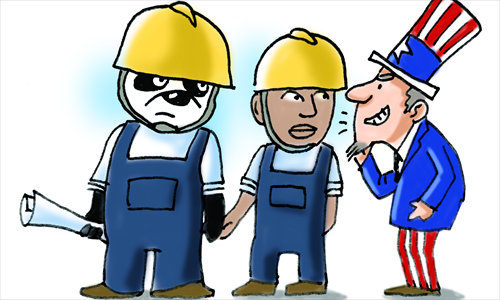HOME >> OP-ED
US attitude toward Sino-African ties petty
Source:Global Times Published: 2015-7-29 23:28:01

Illustration: Liu Rui/GT
US President Barack Obama delivered a speech at the African Union's headquarter in Addis Ababa on Tuesday. While stressing the US contribution to Africa's democracy, Obama insinuated that China's cooperation with Africa is based on "employing foreign labor or extracting Africa's natural resources." Before his visit, a BBC reporter had already reminded Obama that the African Union's headquarters and the road he is walking on were built by Chinese. However, Obama is still obstinately highlighting the superiority of the US-Africa cooperation over that with China.Chinese leaders have never talked about the US policy toward Africa in any Africa-related activities. This reflects the petty attitude of Obama and the US toward the achievements of China-Africa cooperation.
Such a petty attitude may be excusable. The US trade volume to Africa dropped from $125 billion in 2011 to $73 billion last year. On the other hand, China's trade with Africa reached $220 billion last year, three times that of the US. It seems that this has shaken US confidence in dealing with Africa-related issues.
China's cooperation with Africa is much more natural. The win-win principle has united China and Africa. Both sides share the equal status. This is not the same with the US. Washington regards itself as far above Africa, and this has dragged both sides into an awkward situation, triggering dissatisfaction and complaints from each other.
What is more important is that China has no intention to compete with any country in the African continent. China is comfortable seeing the US devoting more attention to this region.
Most of the Chinese capital has been invested in the infrastructure projects in Africa, and the US has put more efforts in building civil society. The efforts from China and the US are complimentary. China also wants to see an honest and orderly African community. China looks forward to various social achievements brought by the democratic development in Africa.
However, the US has put great efforts in touting the Western political system to Africa. Washington insists that it is the political prerequisite to aiding Africa. It also uses it as the evidence to prove that the China-Africa economic relationship is "substandard" and labels China as a country that only cares about its own interests. This is an unreasonable and arbitrary argument.
It seems that Westerners regard it unnecessary to consider the feelings of the Africans when importing their values to this continent. Obama has denounced several African countries including Ethiopia for their poor record on democracy and human rights. Obama should understand that democracy in these underdeveloped countries cannot be achieved overnight.
The good wishes for good governance and democracy will become merely slogans if these countries lag behind in infrastructure and education. The development of infrastructure will boost the economic prosperity, and education will enhance the quality of its population. Democracy and human rights can only be an advantage in economically-developed countries.
Beijing has no intention to argue with Washington over which path Africa should follow for development. Only African countries can make the final decision on this issue. We hope that instead of denunciations, the US can cooperate with China in Africa. If Americans can kindly respond to China's stance, it is likely that Africa, China and the US can achieve a win-win situation.
Regardless of Washington's stance, it is necessary for China, while keeping up its strengths, to learn from the West in order to make up its own shortcomings.
For instance, many Western NGOs and volunteers have stayed close to the grassroots in order to get to know Africa better. This will win support from people and alleviate Africa's dissatisfaction with the West. Besides economic cooperation, China should also explore other fields to collaborate with the region.
Washington is attempting to push us aside. China will consolidate its position in Africa if it, instead of throwing tantrums against Washington, manages to keep up its strengths and learn from other countries.
Confrontation is increasingly inapplicable in today's world and cooperation is becoming the first rule for human development. The US has been a super power for such a long time, but it has failed to figure this principle out.
It is a pity that Obama, with his experiences and ancestor roots, has delivered a "colonial" speech in Africa.
The article is an editorial published in the Chinese edition of the Global Times Wednesday. opinion@globaltimes.com.cn
Posted in: Viewpoint